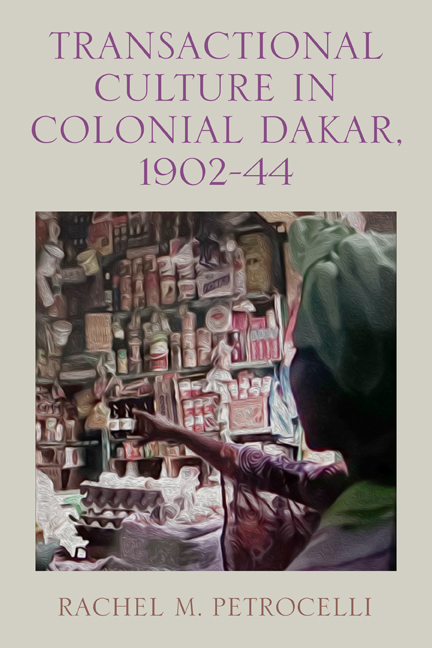Book contents
- Frontmatter
- Dedication
- Contents
- List of Illustrations
- Acknowledgments
- Introduction
- 1 Illusory Roots: Europeans, Autochthony, and Visions of a Capital City
- 2 The Rhetoric of Refoulement in Colonial Dakar
- 3 Challenges and Solutions of the Transient City
- 4 Impediments and Ingenuity in Financial Life
- 5 Ethnic Boundaries, Economic Niches, and Ambiguities in the Colonial City
- 6 The Lebanese and the Local in the Interwar Period
- 7 War’s Window: Urban Informality and Control
- Epilogue
- Bibliography
- Index
1 - Illusory Roots: Europeans, Autochthony, and Visions of a Capital City
Published online by Cambridge University Press: 08 May 2024
- Frontmatter
- Dedication
- Contents
- List of Illustrations
- Acknowledgments
- Introduction
- 1 Illusory Roots: Europeans, Autochthony, and Visions of a Capital City
- 2 The Rhetoric of Refoulement in Colonial Dakar
- 3 Challenges and Solutions of the Transient City
- 4 Impediments and Ingenuity in Financial Life
- 5 Ethnic Boundaries, Economic Niches, and Ambiguities in the Colonial City
- 6 The Lebanese and the Local in the Interwar Period
- 7 War’s Window: Urban Informality and Control
- Epilogue
- Bibliography
- Index
Summary
Rooting Transience through Residence without Settlerism
Dakar was not a deeply rooted Atlantic city born of the earlier commercial era but a new city erected during and following the moment of colonial conquest, representing the new relationship between France and West Africa. France did not consider its major cities in Africa to be sites of indirect rule or places in which native authority as conceived by the state would hold sway. Rather, they were sites of France's power, embodied in signs of French civilization and ideals, which were not masked but overtly conveyed. French administrators saw the presence of their own as a boon and marker of modern urban life in their cities in sub-Saharan Africa, which they understood to be inherently nonurban and unmodern.
This chapter explores the complex relationship with residence that existed at the level of the colonial state, pointing to the importance of its ideas regarding two populations—one that it termed European and another that it recognized as autochthonous—in helping it project attitudes toward everyone else. It reveals that white residence dictated French priorities in Dakar, even in the absence of a settler dynamic, while also showing that the existence of a community of autochthons provided a language of rightful urban belonging to only a limited group of Africans. Dakar was not built atop a tabula rasa. The society that inhabited the Cap-Vert peninsula shaped the evolution of urban forms and dynamics, as occurred throughout colonial Africa. John Parker's work on Accra showed that many of the important debates that emerged with urban growth occurred not only between the state and Africans but within African communities, especially autochthonous ones. Working in Yoruba towns, Margaret Peil proposed a model for the interactions between autochthons and newcomers, positing the ways in which each adapts to the other by way of turning to different livelihoods. These are important perspectives that intervene in the tendency to perceive dynamics involving autochthons as ethnically defined or principally tied to land ownership concerns. For Dakar, autochthony influenced both transactional culture and the model of transient residence as well as the racial contours of French assertions regarding city dwelling.
- Type
- Chapter
- Information
- Transactional Culture in Colonial Dakar, 1902-44 , pp. 19 - 39Publisher: Boydell & BrewerPrint publication year: 2024



